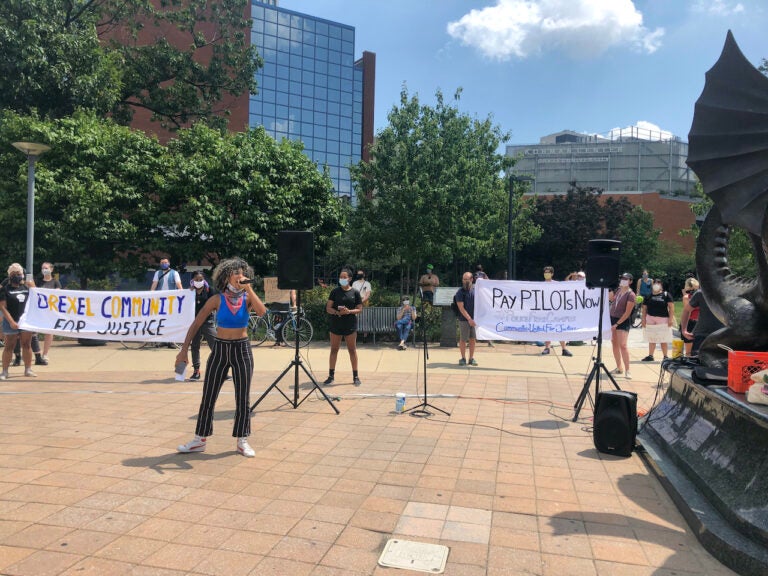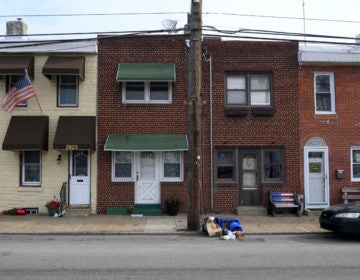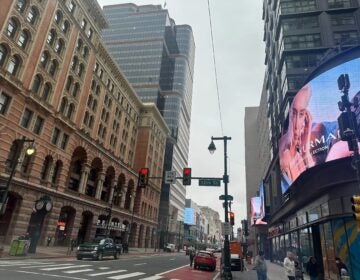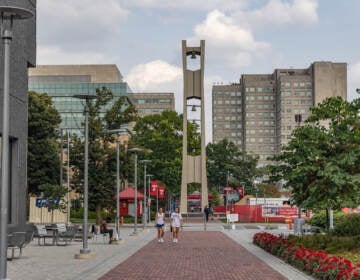Philly’s other big universities stay silent after $100M UPenn donation
When the school made its announcement, City Councilmember Helen Gym and others voiced hope that other universities with large landholdings would pony up.

Samantha Rise from Girls Rock Philly addresses a crowd during a march on Aug. 9, 2020 in University City. (Courtesy of Penn Community for Justice)
Two weeks after the University of Pennsylvania made a $100 million contribution to the School District of Philadelphia, it’s unlikely the cash infusion will inspire copycat donations from major higher education peers in the city.
When the Ivy League school made its announcement, City Councilmember Helen Gym and others voiced hope that other universities with large landholdings, like Temple or Drexel, might also pony up.
“I certainly hope that some of our strongest civic institutions can see beyond their individual acts of charity and generosity,” she wrote in a statement. “When universities and our major nonprofits, who have long been invested in education and public health, unite on a mission to invest in our schools, we send a clear message to Harrisburg and to Washington, D.C. that we are invested in our future.”
Advocates have long argued that local tax-exempt entities, like universities and hospital systems, ought to commit to voluntary payments in lieu of taxes or “PILOTs,” not unlike UPenn’s decade-long commitment to the cash-strapped school district. Most Ivy League institutions, like Harvard and Yale, send PILOTs to local municipalities.
Although Temple and Drexel’s endowments amount to less than a tenth of UPenn’s $14.7 billion largesse, both benefit from a sizable break on taxes for their sprawling campuses and other properties. Records show each directly controls assets valued by the city at roughly $1 billion.
Drexel President John Fry said the institution has no plans to pay PILOTs, though the private university applauded its West Philadelphia neighbor, which owns an estimated $3.2 billion in property.
“Drexel shares with Penn a strong commitment to local public schools and we pledge to work alongside Penn in helping to ensure that all Philadelphia children can learn in safe and healthy school buildings,” Fry wrote in a statement, noting investments from Drexel in two University City public schools, Samuel Powel Elementary and Science Leadership Academy Middle School.
Four days before the UPenn announcement, Drexel’s Government and Community Relations VP Brian Keech published a prescient article in an internal newsletter arguing that it already provided the city with ample “services in lieu of taxes,” totaling “between $25 and $50 million” annually.
Those services, he wrote, included everything from Drexel’s investments in the overhaul of the two neighborhood public schools, down to street maintenance, extra security, or other services provided by organizations supported by Drexel, like the University City District, an economic development agency. The school also supports small businesses and provides other community benefits, he noted.
“These are services provided and paid for by Drexel that relieve the city, state, and federal government of some of the burden of providing those services,” he wrote.
Temple spokesperson Ray Betzner, meanwhile, said the North Philadelphia university supported the city through $84 million in “charity and under-reimbursed” care delivered through its hospital system and $11 million in scholarships, among other initiatives.
The school receives state funding but is independently operated.
“These are ongoing commitments from Temple that directly respond to the needs of our neighbors,” he wrote.
‘A great opportunity to look good’
The responses are a blast from the past. Temple issued a similar statement in 2015 when Mayor Michael Nutter sought to extract PILOTs from wealthy nonprofits. And UPenn itself mounted similar arguments against a 1990s PILOT contribution program, asserting that the university’s economic impact was a contribution enough.
Decades of institutional expansion had left the city with about 12% of all property exempt from taxation. In 1995, amid a deep municipal budget crisis, then-Mayor Ed Rendell’s administration advocated for a PILOT scheme that acknowledged some of these contributions, seeking to collect a third of what large nonprofit organizations would owe, were they not tax-exempt. They eventually negotiated some $8.4 million from organizations ranging from UPenn to insurance giant Independence Blue Cross — the equivalent of about $14 million a year today, when adjusted for inflation.
But the Rendell agreements only lasted five years. By 2001, UPenn and other organizations’ voluntary contributions had dwindled to nothing.
Today, activist groups like Penn For PILOTs, pursue a similar goal in pressuring university administrators to commit to a program of voluntary contributions: pay 40% of what would be owed. Penn For PILOTs member and assistant professor Jolyon Thomas hailed his university’s $100 million commitment to the school district but said the group was still lobbying for more.
“That 40% acknowledges that they do offer services to the city,” Thomas said. “What Penn is doing is really just a fraction of what we think they should be doing.”
Thomas pressed for peer institutions to follow suit.
“I would love to see some of the other wealthy nonprofits show Penn what a real PILOT looks like,” he said. “This is a great opportunity to look good. UPenn shouldn’t get all the credit.”
Faculty, students, and alumni at Drexel and Jefferson University launched similar advocacy campaigns this year. Sam Susson, a Jefferson alumna, said she helped form one such group at the teaching hospital, which has a medical campus situated on blocks of valuable downtown real estate.
She said the group had written to administrators, but received a noncommittal response. Susson linked increased educational funding with the public health outcomes she believes the medical school had a vested interest in supporting.
“Students are being exposed to toxic lead or asbestos. There is not enough health care later in life to make up for Black and brown children being exposed to toxins,” she said. “It’s important for us, as a hospital, to step into that role and understand the health impacts of school buildings being in that state.”
A Jefferson University spokesperson did not immediately return a request for comment.
At Drexel, Professor Winter Schneider helped form a “PILOT action team” several months ago that wrote letters to President Fry in support of voluntary contributions to the city. She said the group had not received any direct response, beyond the public statements administrators had published online.
Schneider accused Drexel of including self-serving initiatives in the laundry list of services administrators presented to wave off calls for PILOT-like programs.
“I’m concerned that the kind of language that’s used by Drexel is meant to cloak its actual engagement with the city,” she said.
Schneider pointed to the university’s marquee investments in the Powel/SLA public schools, where her child is currently enrolled. She said the investment seemed similar to UPenn’s investment in the Penn-Alexander School, another West Philly public school that saw gentrification accelerate in the wake of the university’s investment.
“My feeling is that Drexel is aiming for a parallel process with Penn-Alexander, in terms of their relationship to that school and that school’s role in catalyzing change in the surrounding neighborhood, like gentrification,” she said.
Schneider said the cool response from administrators towards PILOT ignored not only the past tax breaks the institutions had benefited from but also decades of university expansion and programs to promote development around the campus, which she said had displaced working-class residents.
“I’m not surprised they responded by protecting their own wealth,” she said of those statements. “They’re afraid to open the door to a conversation about PILOTs. It would force them to discuss larger structural inequities.”

Subscribe to PlanPhilly
WHYY is your source for fact-based, in-depth journalism and information. As a nonprofit organization, we rely on financial support from readers like you. Please give today.







